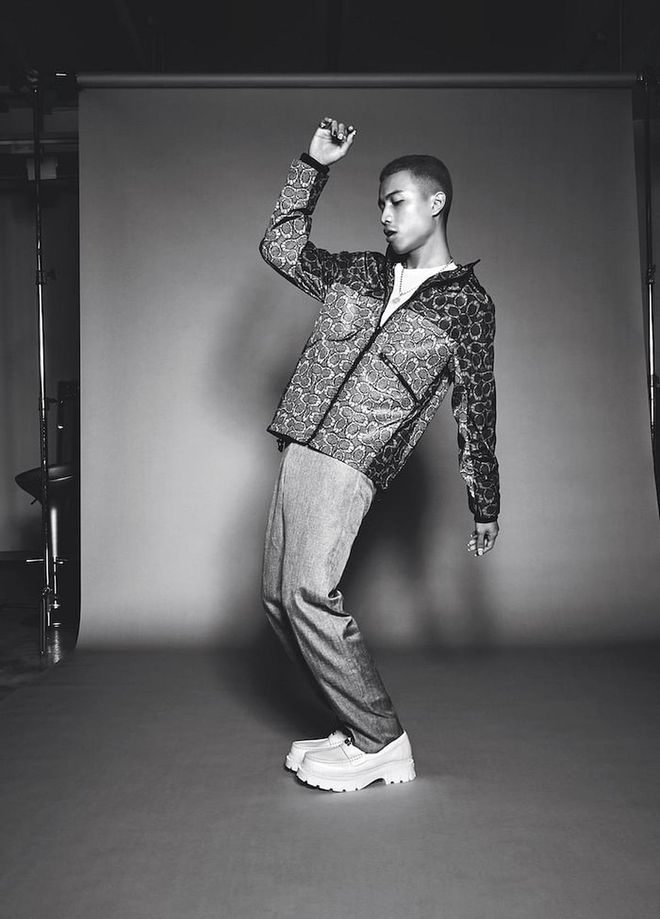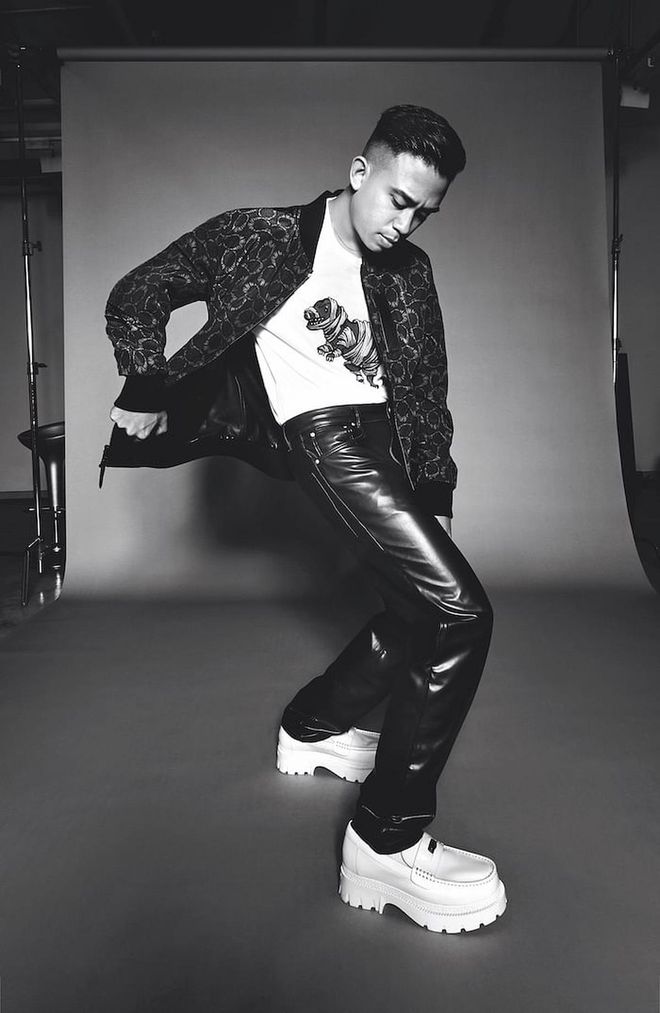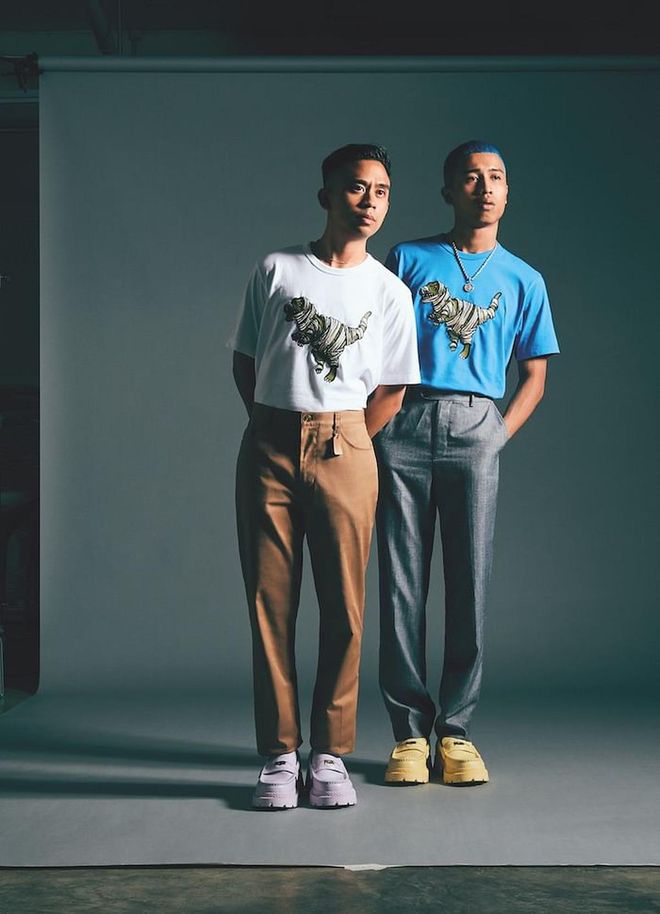

(On Alyph; left) Hoodie, Coach x Michael B. Jordan. Trousers; necklace (worn throughout), Alyph’s own. (On Jabba) Hoodie, Coach x Michael B. Jordan. Jeans; ring, Jabba’s own. (Photo: Cher Him)
Alyph has been part of the music industry since 2005, first as one half of hip-hop duo SleeQ and later, after the pair disbanded in 2015, as an in-demand producer and collaborator for some of the region’s biggest names, such as Malaysia’s Joe Flizzow and SonaOne. This year, the 32-year-old rapper and singer made a solo return to the spotlight with the release of his EP III/III in September—its lead single “Adakah Kau Mendengar” has since surpassed 1 million streams on Spotify. Fariz Jabba, meanwhile, came onto the scene relatively recently, breaking out in 2017 after his freestyle raps and witty Malay remixes of rap hits such as “Gucci Gang” went viral on social media. Since then, the momentum has only built—the 24-year-old’s singles “Masa” and “Ape Sia” have been streamed more than 3 million and 1 million times respectively. Both artistes are now signed to Def Jam Southeast Asia. Here, they grill each other on their journey thus far—the highs, the lows, the ways they’ve grown—and how the culture can move forward.
Fariz Jabba (FJ): Alyph, what’s your most memorable performance?
Alyph (A): It’s got to be the time I performed in Tawau, Sabah, in 2013 or 2014. I had never been there before and the crowd was so loud, the stage was rumbling. For the first time, I realised that you never really know who listens to your music. What’s yours?
FJ: I’d say the 2019 IGNITE! Music Festival. We (Jabba and Yung Raja) performed at the 2018 fest and that was pretty crazy, but when we went back in 2019, we were kind of familiar with the place already and because we watched our performance the previous year, we were like, “Yo, we’re gonna do it much better.” I remember being nervous walking down from the green room to the stage, but when we walked out, we heard the crowd chanting our names—“Jabba! Raja! Jabba! Raja!” That was unreal.
Related article: All Hail Yung Raja, The Rapper Who Is Making Singapore Proud
A: Are you aware of your vices?
FJ: Fully.
A: What do you think of them?
FJ: I try not to demonise my habits—I think that’s a perspective that I’ve gained with experience. Instead of looking at them as something I shouldn’t have, I try to learn why I lean on these things, why I use them to cope or whatever—like, am I running away from something? What about you? Are you aware of your vices?
A: Yes, very much so.
FJ: So how do you feel about vices in general? Do you feel like they’re something you’ll have your entire life or are they things you’re trying to eliminate?
A: I think once you spend a little too much time thinking about your vices, it might start holding you back from becoming whatever it is that you really want to become.
FJ: What about monogamy? Do you believe in it?
Related article: Gentle Bones Partners With Tommy Jeans For Album Launch

Fariz Jabba wears jacket, by Coach x Michael B. Jordan. Trousers and shoes, both by Coach. Necklace; ring, Jabba’s own. T-shirt, stylist’s own. (Photo: Cher Him)
A: Yes, I do. In my youth, I didn’t get it—my thinking then was that I must do everything that I want to do in life. But in the phase of life I’m in now, I see monogamy as a form of discipline that gives me structure when it comes to love... being without structure can mean destruction. So I try to seek structure in the things that I go through.
FJ: But structure is also something that can be ingrained in you as a child, through the examples of the world.
A: Of course; upbringing plays a part. And experiences too. That’s why we can’t expect everyone to approach or go through things the exact same way we do. But I do think that everyone needs a certain degree of structure.
FJ: Have you always had this need for structure in your life?
A: Actually... never.
FJ: But you just said...
Related article: In Conversation With Gentle Bones And Gamaliél On Their New Single “Positive Procrastination” And More
A: I never realised that I’ve subconsciously and consciously chosen to have structure in my life— be it in love, music, career or how I make friends. I only realised that it was structure these past two years when we had nothing else to do and in turn started to explore ourselves. What about you? What’s the most amazing thing you learned about yourself since this pandemic happened?
F: I realised I’m capable of discipline—an idea I’ve disliked throughout my entire life.
A: I think you’re still incapable of discipline.
FJ: (Laughs) I don’t mean I’m practising it; I just said I’m capable of it. That’s the change. Through the pandemic, I was forced to look inwards and I evaluated a lot of the decisions I made in my life—they were always based on my desires. Through this pandemic, I actually put myself through certain structures of discipline and I’ve surprised myself with what I can achieve—big shifts in perspective that happened through just having discipline. I always thought that discipline would be a huge feat until I gained the understanding that it’s nothing but the act of consistency.
Related article: Who Is Wi Ha-Joon, The ‘Squid Game’ Police Officer Who Dazzled On Screen?

Alyph wears jacket and t-shirt, both by Coach x Michael B. Jordan. Shoes, by Coach. Trousers, Alyph’s own. Socks, stylist’s own. (Phot0: Cher Him)
A: If you were appointed Prime Minister of the world, what would be your solution to end this pandemic?
FJ: Wow. So I’m the guy who knows the secret to ending the pandemic?
A: You might not necessarily know the secret, but everyone’s going to follow what you say. What would be your first instruction?
FJ: Damn, this is huge. No pressure! First of all, I’d be like, “Yo, guys, let’s chill.” Secondly, [I’d say] stop fighting. But honestly, if I had all this power, I’d fix poverty first—because you can’t fix the pandemic. If I truly had the power, the rich wouldn’t be able to get richer—they’d pay a huge amount of tax that will eventually go to the countries that need it. I really have a passion for ending poverty in general because I came from that.
A: If you had not come from poverty, do you think you would have been this successful?
FJ: Hmm... because I’ve manifested my life through the insecurity that came from how I was raised, I’ve never actually imagined myself without that insecurity. But as a child, I was always pretty curious and obsessive if I was interested in something. So if I were not poor and was given opportunities and resources or whatever, I think I would still be successful, but my mindset would be totally different. My innate obsession and passion for things—that has been around for a while and I think that’s the main driving force behind my success. What about you, man? What drives you? Obviously, as a child, this whole pop star thing must have seemed so impossible—what made you think otherwise?
A: I’ve been a performer for as long as I can remember. When I was young, my dad would bring back welding gloves for me because I wanted to be like Michael Jackson—though my hands were so small in them, I looked more like Mickey Mouse. I also used to perform songs from all my favourite artistes—Michael Jackson, Limp Bizkit, Linkin Park, Usher, ’N Sync, Lil Wayne—in the toilet. My parents and sister would be banging on the door, but I’d be inside for an hour, just performing and sweating like mad. Even now, when I listen to some of my favourite songs in the car, I’d visualise how they would be if they were my songs—how I would perform them, how the videos would be. It may seem like a childish fantasy, but I think what I’ve been doing has just been about making that [fantasty] come true. On that note, what is success to you?
FJ: This is interesting because all my life, I’ve never clearly defined what success means to me, but I recently did because I saw somewhere that if you want to have a better idea of what you want, you should just list your definition of success. So I was like, okay. Obviously, first thing off the top of my head was earning X amount of money. My list started off very superficial, but I soon looked deeper and listed more substantial things: Being able to speak three languages instead of two by a certain age; being able to say I’ve lived alone overseas for six months by the time I turn X years old; being able to give my parents a certain amount of money every year; being able to buy them a house. Bro, that list went from one page to three.
A: When do you stop, then, and say, I can just live like this until I die? Where is the point that you look back at what you have and what you’ve done and say, I’m good?
FJ: Obviously, off the top of my head, I’d say once money isn’t a problem. The dream is to live with my parents in a huge mansion with all my nieces and nephews around—having everyone together, that’s what success means to me and I could live like that till I die. Family is the one thing that grounds me and makes me realise what the important things in life are. I haven’t been the best son—I mean, I don’t think I’m a horrible son, but as I get older, more and more, I think I could be better. I’ve always kind of ignored the fact that my parents are ageing, but with the pandemic and people getting sick around you, I started to really understand the impermanence of life, how short time really is, and how every single moment with a person is an opportunity for me to give my best energy and be as kind as possible. Okay, last question: When do you think Singapore is going to be a hub, musically or artistically, the way the UK, the US or Japan is? What do you think would be the timeline for that?
A: But you see, time is not the issue. It can happen any time. During the time of Asia Bagus (a local talent show, which ran from 1991 to 2000, that sought out singing talents from the region), during the time of Najib Ali, Sheikh Haikel, Dick Lee, Singapore was the hub. We had the latest gear and the tech—we still do now, but what we don’t have is artistic pride. Because everybody goes into this game with a small voice in their heads saying that Singapore is a small country, so it’s almost like us weirdos who have similar goals of making it in the entertainment industry have to come together. So we make friends, latch on to one another. But because we share our experiences and ideas, because there’s cross-referencing between genres, we end up losing our individualistic capabilities and identities. So for us to become a hub again, we need to stop hanging out with people who are doing the same thing. The problem is, we’re afraid to become artistes by ourselves.

Alyph wear T-shirt, by Coach x Michael B. Jordan. Trousers and shoes, both by Coach. Jabba wear T-shirt, by Coach x Michael B. Jordan. Trouser and shoes, both by Coach. Necklace, Jabba’s own. (Photo: Cher Him)
FJ: Why do you think that is?
A: Again, it comes from that small voice saying that Singapore is a small country, and also because there are so many restrictions here, so many rules, regulations, examples, and being together creates this mob takeover mentality. The only way we can move forward is if everybody goes home and becomes the best version of themselves as people and as artistes before spending that same amount of time with other people. Only then will we achieve versatility, diversity; we will develop excitement. So, yeah, that’s the first thing: Go home.
FJ: Go home and find yourself?
A: Yeah.
FJ: And what would be your advice for a kid who heard this? Like, what’s the first thing you do to find yourself?
A: Don’t listen to any advice that doesn’t feel right. Because for a lot of us, we listened to tons of advice growing up. And let’s be honest: Some of it never felt right, but we followed it anyway because we felt like that was the right thing to do, because we wanted to be a “better person”. But if you don’t feel that it’s the right advice and you don’t follow it, you’re not wrong. It’s about what you want. It’s about individualism. Society might not be as organised if we think that way, but entertainment is supposed to be slightly chaotic, you know?
Photographed by Cher Him
Styled by Jeffrey Yan
Makeup and hair: Sha Shamsi
Photographer’s assistant: Zhan Hong